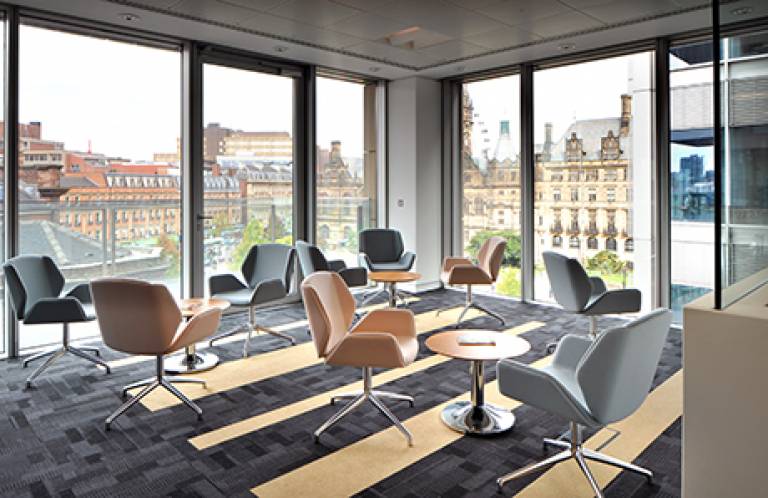
Overview
Feed it Forward—Evidence-Based Design for Healthy and Habitable Workspaces
The project aims to integrate the needs of building users for healthy, habitable and productive workspaces into the early procurement and design stages of a construction or refurbishment project. Through novel evidence-based design methods, Feed it Forward adapts building performance evaluation to systematically consider the social and organisational implications of design and engineering choices. The outcome is an effective and efficient feedback framework, useful for analysing the unique needs of clients as well as providing vital building performance feedback for industry partners.
The Knowledge Transfer Partnership project condenses and interprets end user needs and preferences into evidence-based research and design strategies in order to generate great designs and establish a framework for building performance feedback to industry partners. The “Feed it Forward” approach scrutinises organisational needs and user preferences in workspaces, thus bringing sociological insight into an area dominated by physical building data. Findings are then incorporated into early stage design processes for new or refurbished construction, and are also used in the creation of a viable building performance database for the industry.
The objectives of the Feed it Forward framework include:
· Effective facilitation of customized design outcomes for diverse organizational needs
· Enhanced communication and accountability between industry partners
· Systematic measurement of building design impacts on the functional efficacy of the built environment
Objectives are achieved by introducing evidence-based design methodologies in the form of a user-friendly industry "toolkit".
The kit will provide novel, effective and rapid feedback tools, which can be implemented in pre and post-occupancy evaluation that is cost-effective and provides industry partners with enhanced insights into the impacts of customised design solutions for clients.
People
The Knowledge Transfer Partnership project is a collaboration between the Sheffield branch of Mott Macdonald, Ltd, a global engineering and consulting practice, and two departments at UCL: the Space Syntax Laboratory at The Bartlett School of Architecture and the Institute for Environmental Design and Engineering, which is part of the Bartlett School of Environment, Energy and Resources. The project is led by Dr Angela Vanhoozer (KTP associate), Dr Kerstin Sailer (Space Syntax Laboratory) and Edward Murphy (Mott MacDonald, Ltd.) and is supported by Peter McLennan (Institute for Environmental Design and Engineering).
The project is managed at Mott MacDonald by Michelle O’Neill, and Claire Arbon in the KTP office at UCL Advances supports the project administratively.
The project is funded by Mott MacDonald and Innovate UK under the Knowledge Transfer Partnership scheme.
Outputs
Results and findings of the project will be presented at different conferences in the field including EDRA (Environmental Design Research Association), the Windsor Conference, IFMA’s World Workplace and others. We also aim to publish in high-quality Built Environment journals such as Building Research Information and Environment and Behavior.
Impact
The Feed it Forward project creates a framework and repository for design research specifically geared towards a more purposeful and useful “buildings in use” evidence base.
As a Knowledge Transfer project, the research allows the application of theoretical knowledge in industry and therefore shows a direct pathway to impact. The industry partner, Mott MacDonald will co-create insights and obtain a unique selling point, ultimately demonstrating the company Buildings and Infrastructure (BNI) sector’s leadership in evidence-based design practices. BNI offers engineering consulting services for the life span of built environment projects, and they are “committed to improving whole-life financial, environmental and social performance of built environments that combine comfort, function and beauty whilst remaining efficient and future-proof”.
By taking user feedback into account more systematically, the project aims to improve the quality of building design and the satisfaction of clients and building occupants, leading to more healthy and habitable workspaces.
UCL research and teaching will be advanced in multiple ways:
1) by applying a new approach that takes occupants concerns about the ‘finished’ built project and brings them into early stages of the design and engineering process;
2) by gaining novel insights from new datasets;
3) by articulating and adding nuance to existing theories and
4) by building new theories, i.e. around data collection, analysis and feedback from occupants.
building health wellbeing Close
Close

